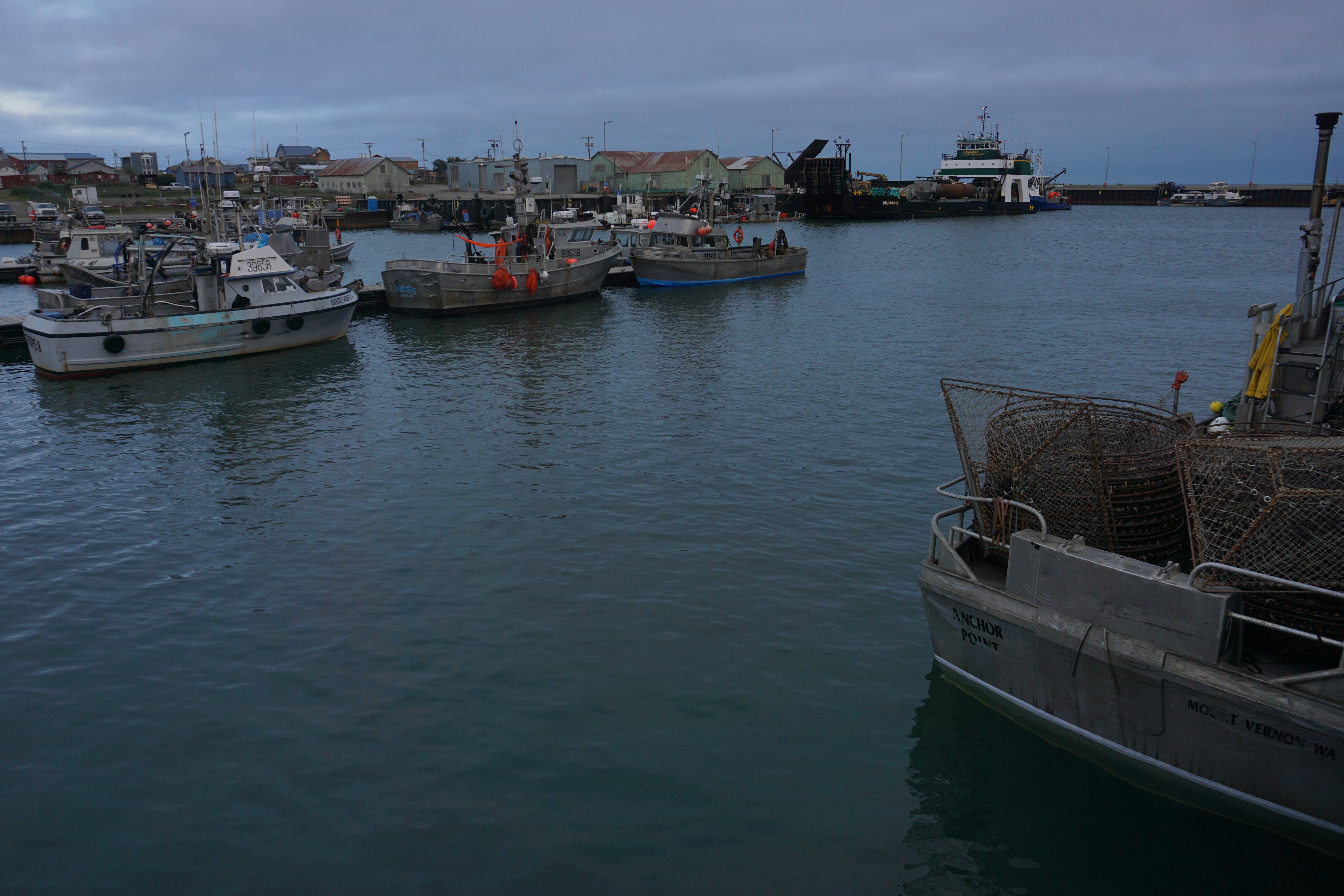Nome’s port is quieter in coronavirus summer, but ship activity continues
The Bering Sea hub won't see tourist cruises this year and fishing is down. But some other marine activity is staying busy.

This was to have been a banner year for cruise ship travel to Nome, the biggest city in Alaska’s Bering Strait region. At least 14 stops in Nome were scheduled this summer for cruise ships, many of them luxurious vessels that had been headed for remote Arctic locations like the Northwest Passage.
That will not happen.
Because of the coronavirus pandemic, all of those 2020 cruise ship visits to Nome are canceled, said Joy Baker, Nome’s port director. Also canceled are most of the Arctic-going scientific cruises that were to have used Nome as a stopping point.
There is still some brisk business at the port in other sectors, however, Baker said.
“With our regulator construction season, we still have to move everything,” she said. Ships and barges with supplies, heavy equipment, lumber, dry goods and other materials are still coming in and out of Nome, she said.
That cargo-related traffic is necessary regardless of the pandemic, Baker said. “Everything that you do down to a store and purchase, we have to ship in,” she said.
Ship crew members coming in and out of the port are staying focused on their work, sticking close to their vessels and generally abiding by Nome’s strict rules aimed at preventing the spread of COVID-19, she said.
“Most everybody cooperates because most everybody gets it,” she said. “If you don’t really need to walk to town to get a beer, you don’t.”
Fishing activity at the port is reduced from normal levels, but a lot of that is for reasons unrelated to the pandemic, said Jim Menard, a Nome-based fisheries biologist with the Alaska Department of Fish and Game.
Crab fishing is on hold because of low stocks, he said. Exactly why the stocks are low has yet to be proven, but Nome residents and scientists have speculated that Pacific cod brought north by warming waters ate up or pushed out much of the crab population.
Last year, the crab harvest was less than half of what was anticipated, and many crab fishermen pulled up crab pots that were filled with cod, Menard said.
“They were going in and helping themselves to a free dinner,” he said of the cod.
Chum salmon runs are poor, too, a status believed to be related to ocean conditions, Menard said. And prices are low as well, giving little incentive right now for chum fishing, he said.
Nome’s fishing fleet is mostly local, so the port does not have the same challenge faced by other Alaska fishing ports of quarantining nonresident harvesters and processors, Menard said.
Elsewhere, those challenges can be daunting. Of the 465 identified COVID-19 cases among nonresidents recorded in Alaska as of Monday, most were from the fishing industry. On Sunday, one company, American Seafoods, confirmed that 85 of the 119 crew members aboard the factory trawler American Triumph had tested positive for the virus. The tests were done while the ship was docked at Unalaska in the Aleutian Islands. The crew was to be taken to Anchorage for isolation and quarantine, the company and the city of Unalaska said in separate statements.
Unlike the fishing industry, Nome’s offshore mining industry comprises a large percentage of nonresident workers. The pandemic has had some effects on that sector.
“I don’t see as many dredges out on the ocean,” Menard said.
But local miners are active this summer, as are the non-local miners who completed Nome’s mandatory quarantine. The latter group includes Emily Reidel of Homer, Alaska, one of the stars of the reality TV show Bering Sea Gold, who has posted information on social media about her return this year to Nome and has spoken about spending her quarantine period on her boat.
The U.S. Coast Guard Marine Safety Task Force, is also continuing to conduct work in Nome and the Bering Sea region as part of the agency’s annual Arctic and western Alaska program. The task force, organized to inspect fuel storage and other sites, has had its work altered by the pandemic, but the visits to sites continue.
The failure of a fuel tank in Norilsk, Russia is blamed for a massive diesel fuel spill there in late May.
As of mid-July, the task force was working out of Nome and had completed exams of 20 bulk-fuel facilities in the region, with more on the schedule, said Coast Guard Petty Officer Nate Littlejohn,
The task force was launched last year to ensure that as many sites as possible could be inspected in the short summer season.
Previous inspection work had been left to Coast Guard’s Anchorage section, but progress was slowed by relatively small numbers of personnel. Establishment of the task force allowed Coast Guard members to come in from the Lower 48 to bolster the program. Last year the program inspected about 60 percent of sites on the list, and planned — at least before the pandemic — to reach the remaining 40 percent, plus make follow-up visits to sites identified as having problems.